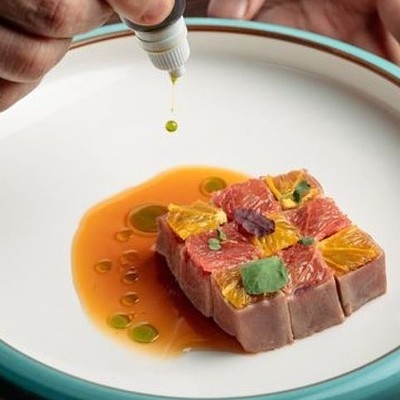Historically, a sommelier was a cellar master who managed a wine collection. He -- and I say he because in the pre-sexual-revolution era, the sommelier was always male -- tracked and tallied the sums of wine (originally stored in cask and later in bottle).
Today, the word is used loosely to denote nearly anyone who serves wine in a restaurant, although the Court of Master Sommeliers submits applicants to a rigorous program of written, performance, and tasting exams before admitting would-be "Master Sommeliers" to the prestigious guild (currently, to my knowledge, there are five Master Sommeliers working in Texas).
So what do you do when you a sommelier hasn't done an effective job of counting the wines in her or his cellar?
I faced this dilemma the other night at Ristorante Cavour (called Houston's "best Italian restaurant" by the Houston Press in 2010) at the Hotel Granduca off of Post Oak, where I dined with a colleague.
I had tried to order three bottles of white wine from the wine list, only to be told that none were available. My insalata mista, made from store-bought mesclun, was only getting warmer, and our amuse-bouche was a distant memory when our first course arrived. But there was still no white wine in our glasses. Forty-five minutes would pass before my dining companion and I had a glass of white wine on the table.
Wine director and Wine Spectator Award of Excellence-winner Jeremie Heng had already been to our table twice. But after bottle number two did not appear, he had seemed to disappear.
Finally, with the fourth bottle we attempted to order, we hit a winner -- a 2010 Domaine des Aubuisières Vouvray -- and the bright acidity and steely minerality of the Chenin Blanc were delicious with my corzetti (a classic disc-shaped pasta of Liguria) topped with pesto and a grilled langoustine. We also enjoyed a fantastic bottle of COS amphora-aged Nero d'Avola from Sicily with our main courses -- a bottle that we snagged on the first go-around.
Oddly, we didn't see the sommelier again until the end of the evening, when he presented me with the check for the wine bill (my companion paid for the meal; I paid for the wine). I couldn't help but tell him that I was surprised that he charged me for the bottle of white wine. Especially in a fine dining venue like this one, I would have imagined that any self-respecting sommelier would be embarrassed by the oversight. I imagined he would offer us a digestif or a glass of Champagne. An aged Armagnac, perhaps? He just grimaced and walked away. I made sure to leave a generous tip because I didn't want the servers to be punished for his slipshod, spotty (literally!) list.
And when I was leaving, he called me over and said, "Sir, please have a look at the wine list." He pointed to the fine print on the bottom of the first page. It read: "All wines subject to availability."
Why write a wine list, I thought to myself, if you don't plan to update it? Why not just tell the patrons which wines are available a voce?
In my opinion (and in my experience), he should have done the following:
1. When it became apparent that the first bottle was not available, he should have offered to sell us a higher-quality bottle for the same price.
2. When the second bottle didn't arrive, he should have sent over a complimentary glass of white or sparkling wine so that we at least had some wine to pair with the food we had already been served.
3. When the third bottle didn't arrive, he should have comped the fourth bottle I ordered.
Is this the beginning of a wine lover/restaurant goer bill of rights?
Next week, I'll follow up by asking top Texas sommeliers how they would have handled the situation.
Follow Eating Our Words on Facebook and on Twitter @EatingOurWords






